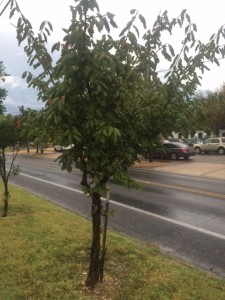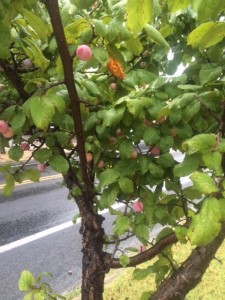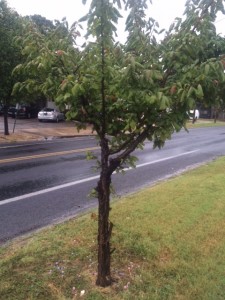Earlier this week, I was walking on the sidewalk along the main street in my neighborhood, and I came across a row of these trees that were planted between the street and the sidewalk. As this area is most likely an easement and because this row persists for a few blocks, I’m assuming the City of Austin or Travis County has planted these trees in this area. (I could be wrong though.)
What first caught my eye and inspired me to identify this tree was its pink-colored, small fruit. At first glance I thought this tree’s fruit looked like dusty gum-balls: the fruit is no larger than a quarter and most of the fruit on the tree is bright pink. I could tell by looking at fruit that had fallen though, that ripe fruit from this tree is more of a dark pink to mauve color.
This gave me the idea that this tree is a type of plum tree. At first I wasn’t sure because the fruit is so small but after inspecting the inside of one of the fruits, it looked just like a tiny plum. From there I went on a hunt to identify the species of this plum tree, but as it was clearly planted and as there are many types of plum trees that could be planted in Texas, I couldn’t pin down the exact species. I was torn between Mexcian Plum and Japanese Plum, but when I observed this tree on iNaturalist, I left the species name “unknown”.
Well, I’m happy to report that there are community members that are just as passionate about species identification as we are, and in just a few short hours, a community member had identified my tree as a Mexican Plum. After doing some research on this species, I’ve confirmed with her that this row of mysterious, pink-fruit trees is indeed a row of Mexican Plum trees.
You can find my iNaturalist observation here.
Mexican Plum, or Prunus mexicana, grow in the wild throughout most of the central and south regions of the U.S. It fruits between July and September and although it is native to Texas, it is important to note that these specific trees were planted. After reading how the fruits from Mexican Plums can attract many species of local birds, I’m wondering if the city (or county, or whoever) planted these native fruit trees in this area, did so with the intention for them to bring birds to an urban area. Regardless who put them there, as this tree-bird relationship enhances local biodiversity, I’m glad they were planted!
More on the Mexican Plum tree can be found here.


